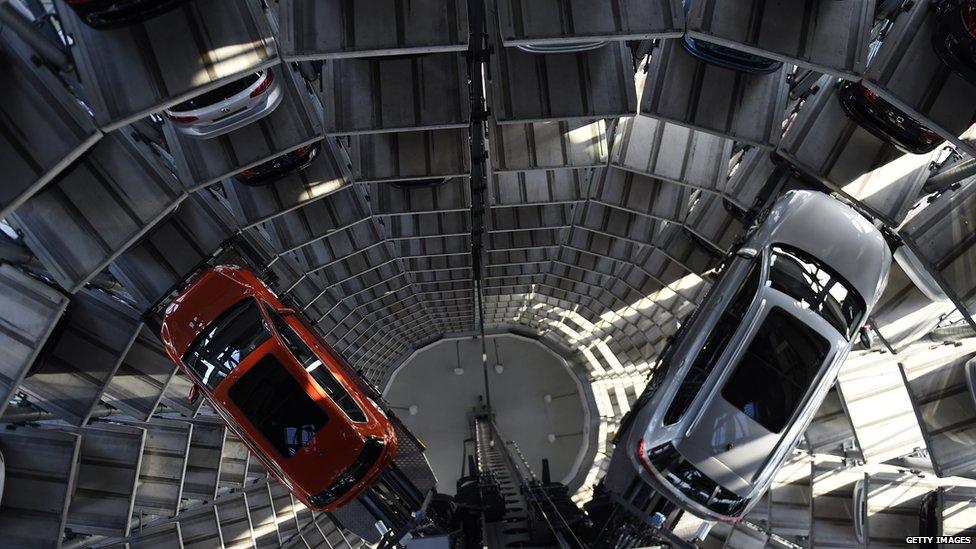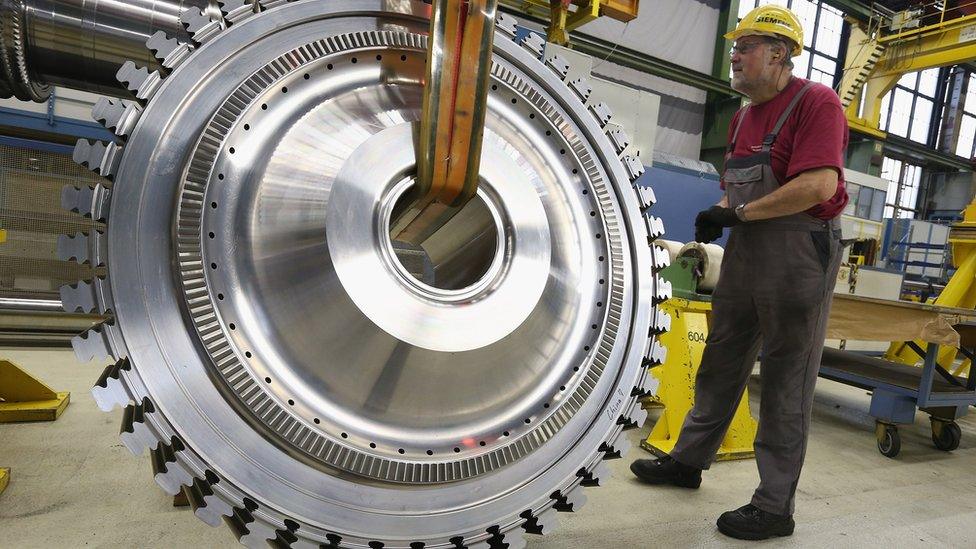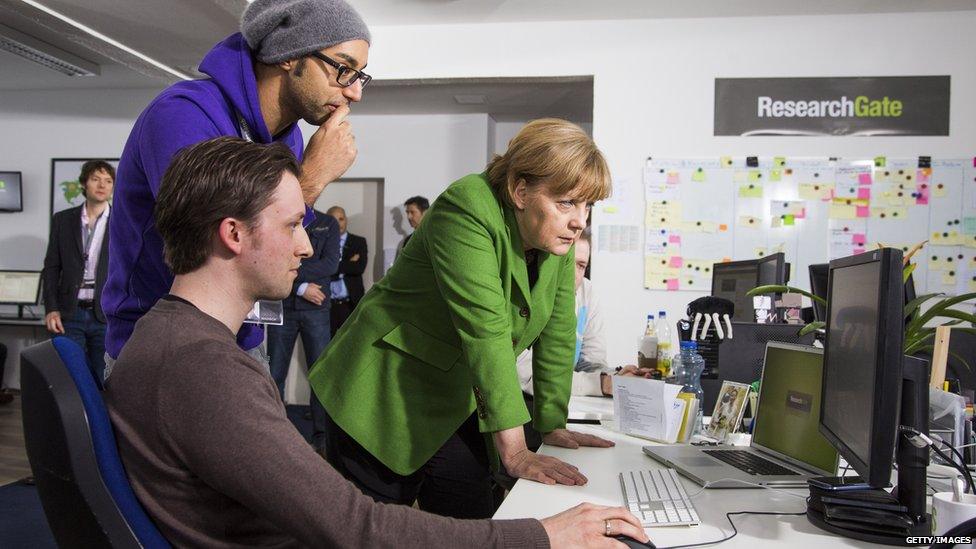Can Germany's manufacturers do digital?
- Published

Germany's manufacturing prowess powers a fifth of the country's economy
September's emissions scandal rocked Volkswagen - but it's not the only issue the German car giant has. Alongside other German manufacturers, it faces a major challenge from the digital revolution sweeping through the world of manufacturing, writes Sean Williams.
Max Vilimpoc, a Berlin-based software engineer, worked as a contractor for VW until this year.
What he saw there, while working on a raft of digital products, shocked him.
VW, he says, approaches the design of digital products the same way it would design a car part or engine component.
In other words, the carmaker treats software like sprockets.
"This works, if you're making a gear that needs to work in all of your cars for 20 years," Max adds. "It doesn't work for software."
Manufacturing is the bedrock of the German economy, and powerhouses such as Audi, Bayer and VW actively advertise their credentials as paragons of Teutonic manufacturing efficiency.

"Made in Germany" is a mark of global renown.
But as products from cars to steel girders acquire sophisticated sensors and are linked to the internet, the digitisation of manufacturing is an area that Germany must master to stay ahead of the digital giants and myriad start-ups moving into this area.
For Germany, whose manufacturing sector comprises 22% of GDP (only China relies on it more), that is bad news.


Not only must Volkswagen and others quickly acquire the digital knowledge, they must undergo a cultural change as well.
'Nightmare'
Some companies have already begun.
Siemens' Electronic Plant, in Amberg, has been making more than 1,000 products, from cruise-ship controls to ski-lifts, since 1989, with computers now controlling three-quarters of the production process.
The German Artificial Intelligence Research Centre, in Kaiserslauten, has, for almost three decades, been perfecting its vision of the "smart factory", where machines can communicate problems, switch between products and remove the need for human employees along the production line.
But many of Germany's largest manufacturers are still ill-fitted for a future that demands digital prowess.
And there is no shortage of reasons why they could soon be left behind.
Volkswagen, like a majority of German manufacturers, is based on a top-down, rigid corporate hierarchy - anathema to the flatter, more open structures preferred by digital winners such as Google or Facebook, where good ideas are encouraged no matter an employee's rank.

Internet companies' more relaxed atmosphere contrasts with the typical, stuffier, German corporate environment
For Mr Vilimpoc, changing software that runs Volkswagen's dashboard became a "nightmare".
He describes a process involving multiple form filling that passed through several layers of management before being presented to the "change control board", which would decide if it should be passed on to the change control boards of other Volkswagen Group companies.
These bureaucracies breed risk-aversion, hampering digital success.
A recent Accenture report on the digital performance of Germany's top 500 companies (excluding financial services) found they were "a long way" from realising the benefits of digitisation.
Digitisation, in the form of "smarter" factories that can quickly adapt to build different components and control quality automatically, is something in which many countries - especially the US, Japan and South Korea - have excelled.
Germany is just waking up to it.
Leading the way are the likes of Axoom, the digital arm of Trumpf, a long-standing family company that makes machine tools for sheet metal production, and other items such as power tools and medical operating tables.
Axoom's boss, Florian Weigmann, describes the company, which was created last year, as an app store for big business.
"It's a different approach in how to grow software," he says, adding that it is allowing clients to choose not from one vendor, but from "an ecosystem where everybody brings something to the table".
The German government has also sought to make strides with Industrie 4.0, a movement that aims to build collaboration between companies and push the digital agenda.
Some 500m euros (£366m) is being invested by the German government into making factories smarter.

The German government has championed the country's start-up scene but how quickly its manufacturers will embrace digital is still a question
That is not easy.
Germany's manufacturers are notoriously reluctant to share information - many made their fortunes from proprietary chemicals, cars or other products in the post-War "Wirtschaftswunder" (economic miracle) - something that runs against the open nature of much of today's successful software.
Elon Musk's Tesla Motors, for example, has stated a desire to share its technology.
The project Max worked on was a collaboration with Audi, one of VW's subsidiaries.
"Neither side had much love for the other," he says.
"But neither was more efficient than the other."
Last August, the government passed its Digital Agenda 2014-2017 Bill, designed to propel Germany into becoming a digital leader.
Not very social
Germany's "Mittelstand" or small and medium enterprises (SMEs) employ more than two-thirds of working Germans yet lag behind in the digital sphere.
The number of SMEs investing in innovation declined between 2004 and 2012, according to KfW, a government-owned development bank.
"The lack of consistent innovation culture needs to be enhanced, either entrepreneurially or as part of start-ups," says Bettina Tratz-Ryan, of researcher Gartner.
However, Teutonic discordance with the digital revolution runs even deeper than that.
Many new services are built on the sharing and mining of "big data", something that jars with German attitudes to privacy, shaped by years of post-War division and East Germany's feared Stasi secret police.
Germany has been slow to embrace social media.
The country has relatively few Twitter accounts.
German Facebook accounts are often opened under a pseudonym.
The opportunity for German manufacturers to make use of big data is probably slimmer than that of their foreign counterparts.
"Data and security are big topics here," says Anette Bronder, director of T-Systems, the IT consulting arm of telecommunications giant Deutsche Telekom.
"Who is owning my data?"
Furthermore, Germany's education system, where attitudes are often old fashioned, is poorly equipped for the modern, digital world.
One tutor told me he had faced criticism for suggesting his school ditched blackboards in favour of connected "smart boards".
Bigger isn't necessarily better
There is one bright spot, however, on the digital horizon - Berlin.
Germany's start-up capital is proof the country can do leading-edge technology well.
"Germany is in a pretty good position digitally," Mr Vilimpoc says.
"A tonne of brains and talent keep moving to Berlin.
"In fact, it's probably not a shortage of talent, but a shortage of really good ideas [that's the problem]."
Cash is also not lacking.
Of Europe's 100 largest companies, 31 are from Germany.
But, for now, Germany's major manufacturers will be looking nervously over their shoulders at rivals taking command of the digital world.
Germany rose from the ashes of World War Two to dominate manufacturing and make its economy a global leader.
Can those same leaders move quickly enough to master a digital revolution?
About the author: Sean Williams is a freelance writer and journalist based in Berlin.